5 Best AI Tools for Systematic Review in 2026
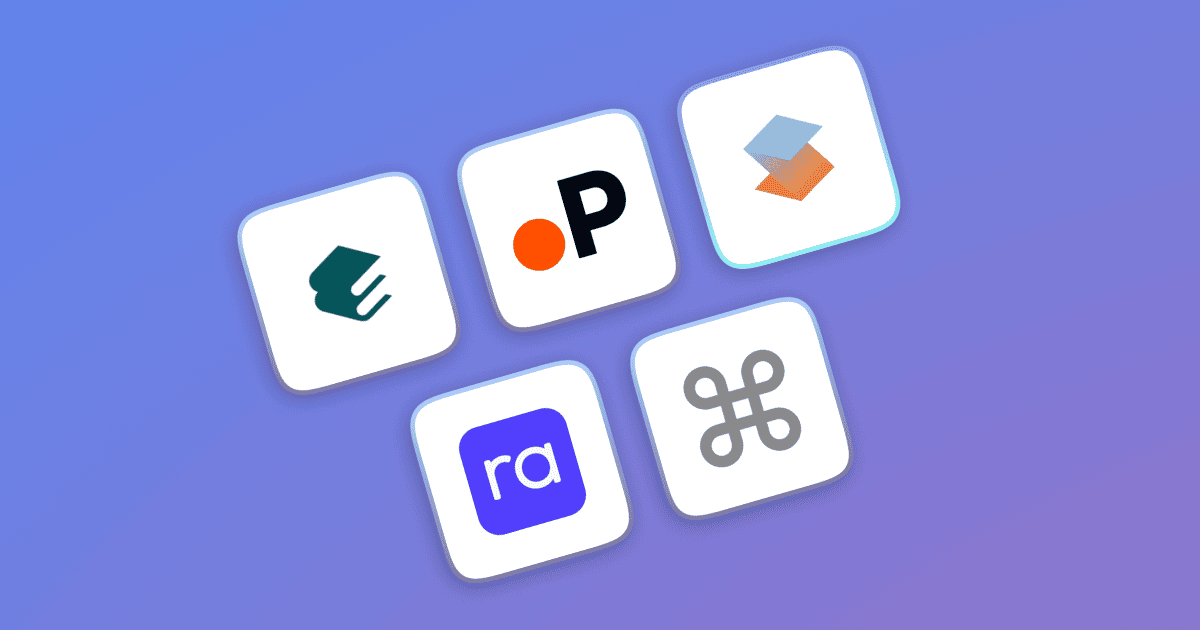
Systematic reviews of literature are essential for synthesizing research findings and drawing meaningful conclusions across various scientific fields. Whether in medicine, social sciences, or environmental research, these reviews ensure that research decisions are grounded in the most reliable evidence. Traditionally, conducting a systematic review paper requires researchers to manually screen vast numbers of studies, extract critical data, and synthesize findings to create comprehensive reviews. While thorough, this method can be time-consuming and prone to human error.
However, in 2026, AI and large language models (LLMs) are becoming more advanced and are increasingly being applied to systematic reviews and meta-analyses. These AI-powered tools are designed to automate many of the most time-intensive tasks, such as data extraction, literature screening, and synthesis. By using AI for literature reviews, researchers can process large datasets more efficiently and accurately. Whether you're conducting systematic reviews in scientific research or aiming to improve research quality, AI tools help enhance both speed and accuracy in the review process.
With the ability to automate systematic reviews, researchers can now focus more on critical analysis and less on repetitive tasks. In this blog, we will explore the best AI tools for systematic literature review and how they support research by improving accuracy, reducing bias, and enhancing efficiency in the review process.
Best AI Literature Review & Systematic Review Tools in 2026
Systematic literature reviews are essential for synthesizing research findings and drawing reliable conclusions across disciplines such as medicine, social sciences, and environmental research. They ensure that decisions are based on the strongest available evidence rather than isolated studies.
Traditionally, conducting a systematic review required researchers to manually screen thousands of papers, extract relevant data, assess quality, and synthesize findings. While rigorous, this process is slow, resource-intensive, and prone to human error.
In 2026, AI-powered literature review tools have transformed this workflow. Advances in large language models and retrieval systems now allow researchers to automate key stages of systematic reviews, including literature screening, data extraction, synthesis, and reporting. These tools significantly reduce manual effort while improving consistency, transparency, and reproducibility.
By using AI for literature reviews, researchers can focus more on critical interpretation and theory-building rather than repetitive tasks. Below, we explore the best AI tools for systematic literature review in 2026, with a particular focus on platforms that meaningfully automate the review process.
Why AI Tools Are Essential for Systematic Reviews
Systematic reviews are one of the most critical research methodologies, ensuring the reliability and comprehensiveness of scientific evidence. However, the traditional process is often time-consuming and labor-intensive, involving extensive manual effort to screen studies, extract data, and synthesize findings. With growing demands for speed and accuracy in research, AI tools are significantly reshaping the process by automating many of these time-intensive tasks.
By incorporating AI tools for systematic review, researchers can greatly improve both the speed and accuracy of the review process. This allows them to concentrate more on data interpretation and insight generation rather than repetitive, manual work. Below are some of the best AI tools for systematic literature review that can streamline the entire research workflow.
Systematic Review vs Meta Analysis: Key Differences
| Feature | Systematic Review | Meta-Analysis |
|---|---|---|
| Definition | A thorough review process that identifies, evaluates, and synthesizes all available research on a specific topic | A statistical method that combines data from multiple similar studies to calculate an overall effect |
| Primary Purpose | To comprehensively gather and critically evaluate all relevant studies | To provide a precise numerical estimate of an effect based on pooled data |
| Nature | Focused on qualitative synthesis and comprehensive analysis | Primarily quantitative, focused on statistical analysis |
| Study Types Included | Can encompass a variety of study designs, including both qualitative and quantitative research | Only includes studies with compatible numerical data |
| Approach to Evidence | Inclusive, reviewing a broad range of studies | Selective, based on the statistical compatibility of the studies included |
| Analysis Method | Uses narrative synthesis, thematic analysis, or content analysis | Relies on statistical models such as fixed or random effects models, and meta-regression |
| Time Required | Typically takes 6–12 months to complete | Takes 9–18 months, as it often includes the systematic review phase |
Top 5 AI Tools for Systematic Reviews in 2026
| AI Tool | Key Features |
|---|---|
| Paperguide | Automated data extraction, AI-assisted literature screening, advanced research synthesis, citation-backed insights. |
| Scispace | AI-driven literature synthesis, customizable review templates, automatic categorization of studies, in-depth thematic analysis. |
| Elicit | AI-powered summaries, automated data extraction, advanced search filters, customizable research templates. |
| Rayyan | Semi-automated abstract and title screening, machine learning for study relevance, collaborative feature for multi-user projects. |
| DistillerSR | Automated study selection, data extraction, risk of bias assessment, customizable workflows for systematic reviews. |
1. Paperguide
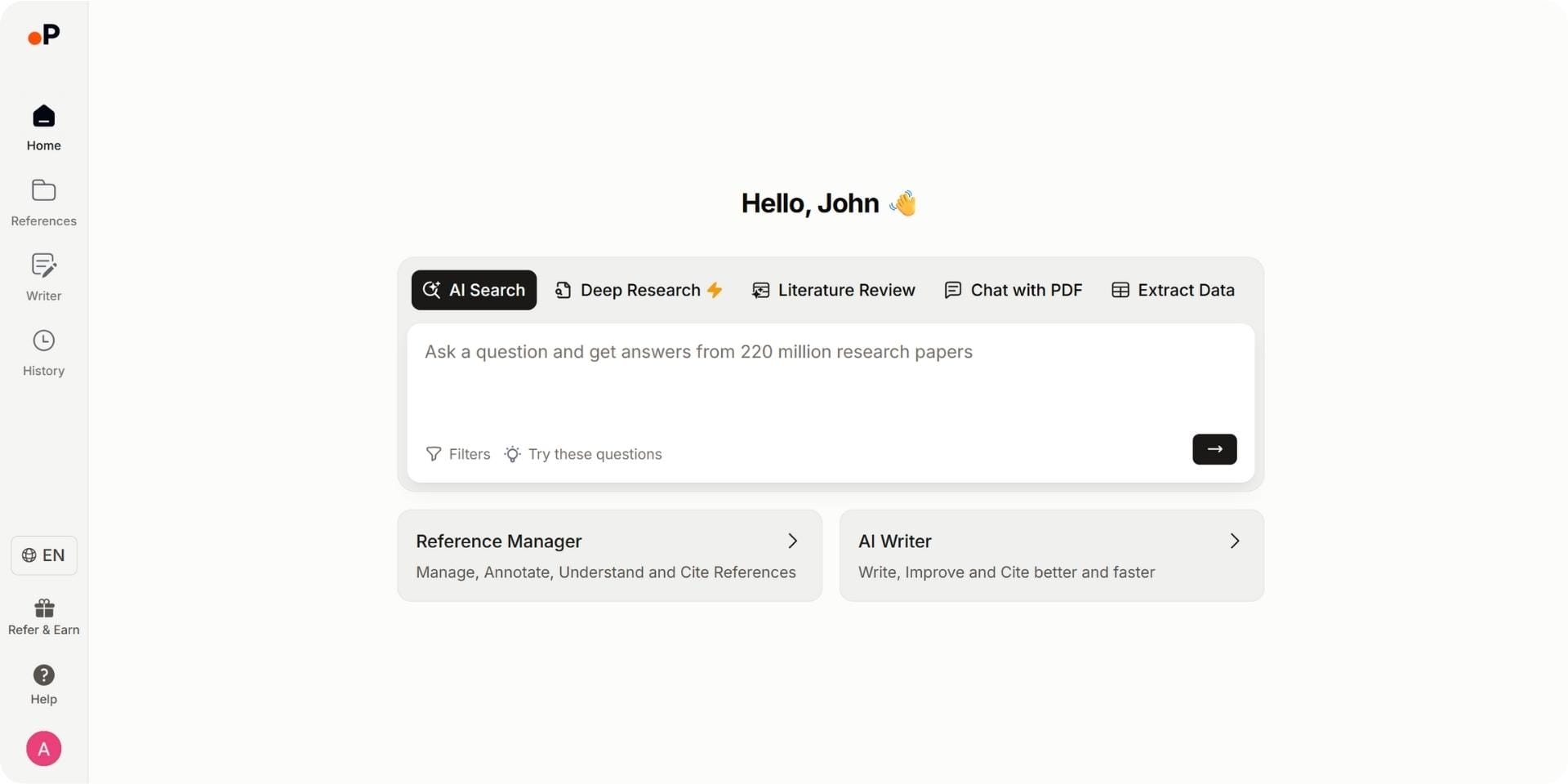
Paperguide is an all-in-one AI research assistant designed to simplify and automate various stages of the systematic review process. In 2026, it is widely regarded as the best AI literature review tool for scientific research, thanks to its Deep Research feature that fully automates systematic literature reviews. Researchers simply input a research question, and Paperguide searches millions of papers, extracts relevant data, and generates a fully synthesized report with citation-backed insights. This AI-powered approach significantly speeds up literature reviews, reduces manual effort, and improves the accuracy and consistency of systematic review papers.
How Paperguide’s Deep Research Fully Automates Systematic Review Process
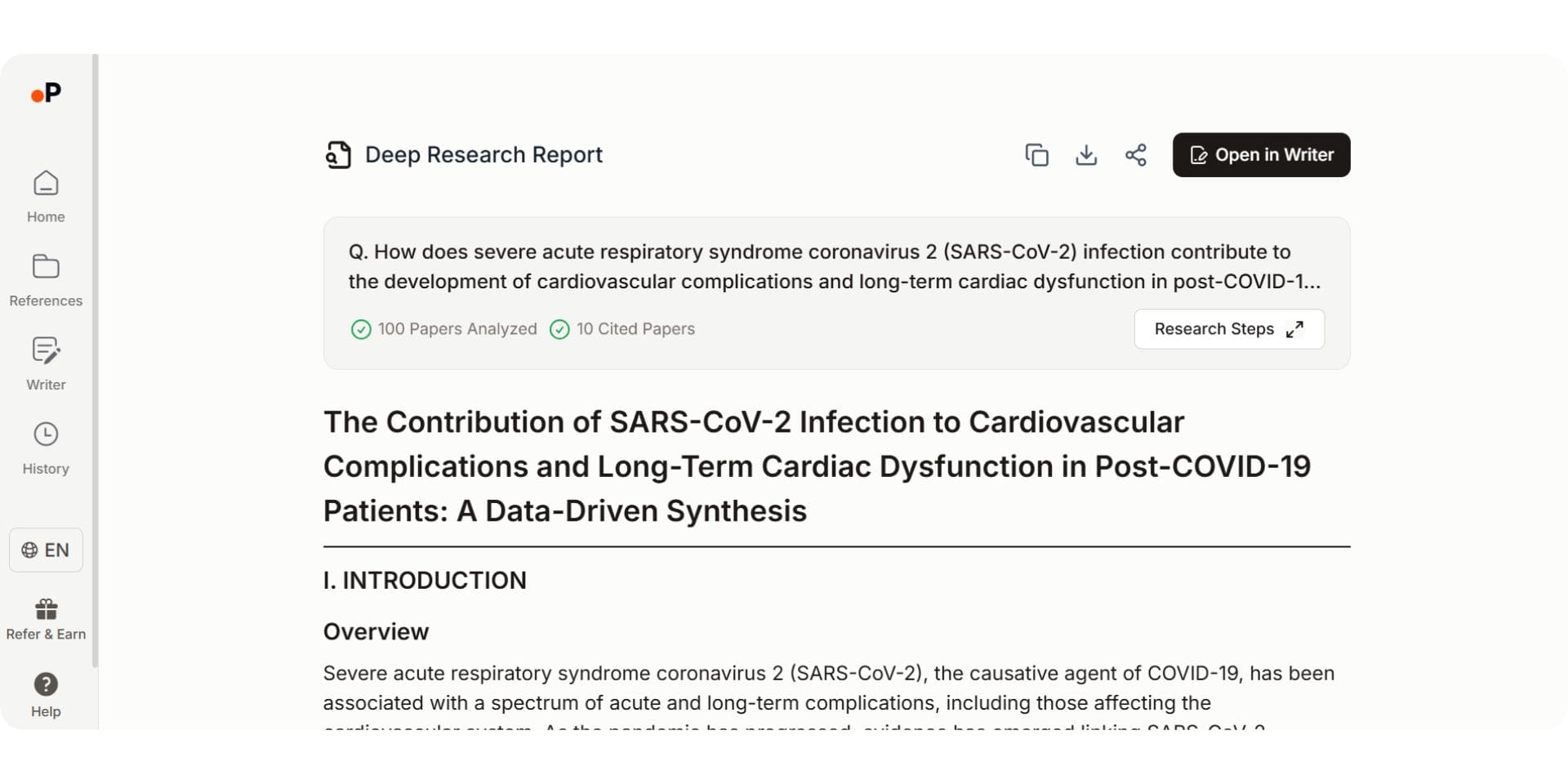
Paperguide’s Deep Research feature offers an automated, streamlined approach to conducting systematic reviews. The process begins by inputting a clear research question, allowing the tool to quickly sift through vast databases of research papers. Within minutes, Paperguide generates a Deep Research Report, which synthesizes relevant findings from multiple studies, extracts key data, and provides citation-backed summaries for further analysis.
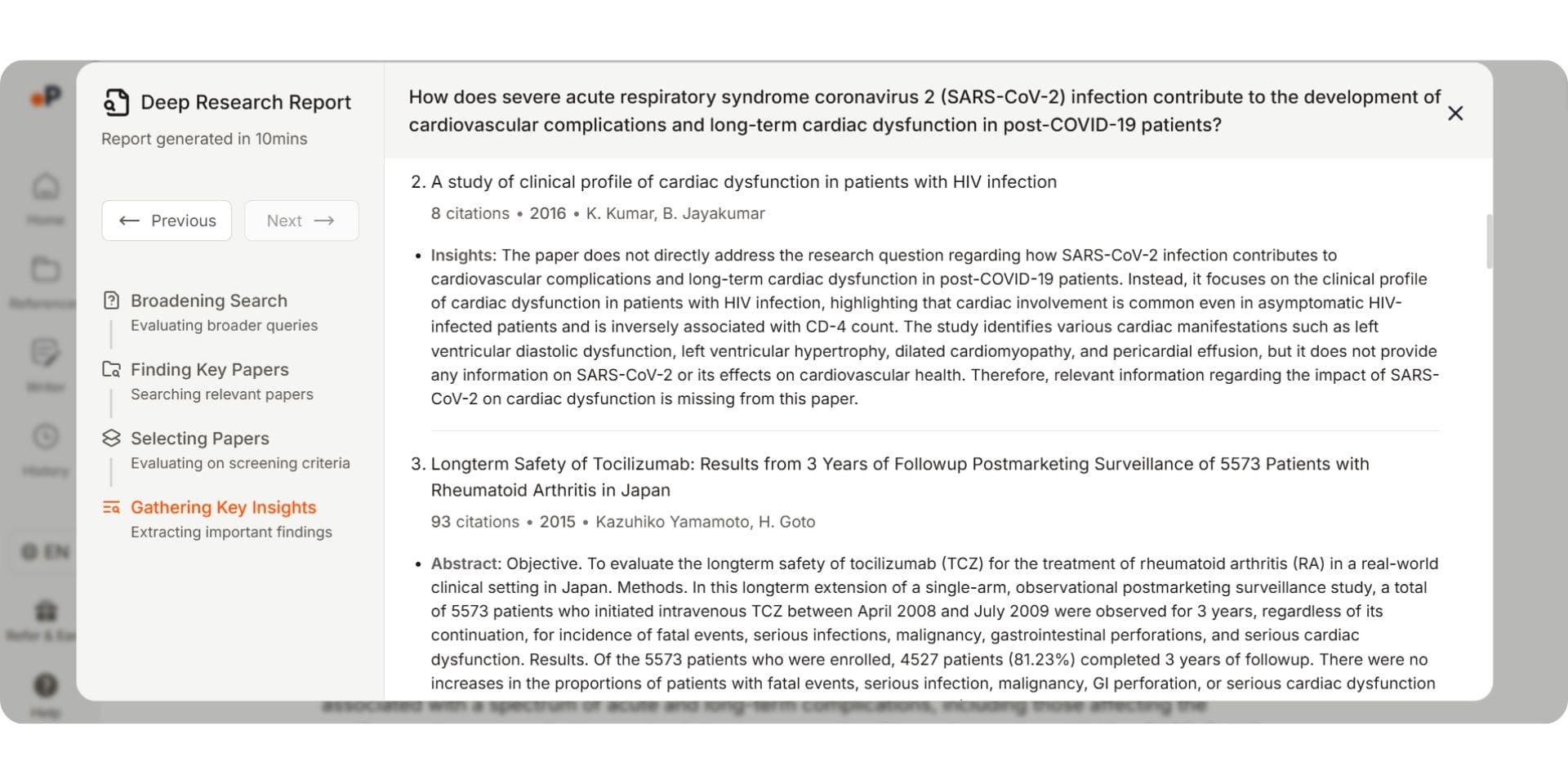
What makes Paperguide particularly effective is its ability to automate the review process, allowing researchers to focus on higher-level tasks, such as interpreting findings and proposing new directions for research. This tool is designed to handle large-scale reviews, offering comprehensive reports on the entire body of literature related to the user's research question.
Key Features of Paperguide - Deep Research Reports
| Feature | Description |
|---|---|
| Fully Automated Systematic Review | Paperguide automates the entire process of study selection, data extraction, and research synthesis, significantly speeding up the review process. |
| AI-Powered Data Extraction | Automatically extracts key data from research papers, such as sample size, methodology, results, and more, improving efficiency and consistency in the review. |
| Synthesis of Findings | AI synthesizes findings from multiple studies into a cohesive, citation-backed report, offering a comprehensive summary of the literature. |
| Real-Time Report Generation | Paperguide generates your Deep Research Report in under 10 minutes, saving hours of research time and providing instant access to your findings. |
| Citation Management | Generates citation-backed insights for all included studies, making it easy to organize and reference findings according to the appropriate citation style. |
| Customizable Search Parameters | Tailor search criteria to focus on specific research topics, ensuring that only the most relevant studies are included in the review. |
Pros
- End-to-End Solution: Handles the entire systematic review process, from research question formulation to data extraction and citation management.
- Time-Saving: Automates repetitive tasks in systematic reviews, reducing the overall time spent on research.
- Comprehensive Reports: Provides AI-generated reports that synthesize findings from various studies into a well-organized, citation-backed summary.
- User-Friendly: Designed with researchers in mind, Paperguide offers an intuitive interface for easy setup, customization, and navigation.
- Real-Time Collaboration: Allows team-based collaboration, ideal for collaborative reviews.
Cons
- Free Plan Limitations: The free plan is limited to 2 Deep Research Reports per month, which may be insufficient for large-scale reviews.
- Learning Curve: While intuitive, new users may need time to familiarize themselves with the customizable search parameters.
- Best Results with Specific Research Questions: Works best when provided with clearly defined research questions and broader topics may yield less focused results.
Best For
- Academic researchers, PhD scholars, and thesis writers who need a comprehensive AI tool for systematic literature review and citation management.
- Research teams conducting large-scale systematic reviews in scientific research, particularly those requiring real-time collaboration.
- Researchers seeking an AI-powered solution to automate and streamline their systematic review and meta-analysis process.
Pricing
- Free Plan: $0/month
- Includes 5 AI generations/day, 2 Deep Research Reports/month, 500MB storage, AI Search, Reference Manager, and more.
- Plus Plan: $12/month (Billed Annually)
- Includes unlimited AI generations, 10 Deep Research Reports/month, 50 columns, 5 Full Document Generations, and Plagiarism Checker.
- Pro Plan: $24/month (Billed Annually)
- Includes unlimited AI generations, 50 Deep Research Reports/month, 100 papers per workbook, 20 Full Document Generations, and Plagiarism Checker.
2. Scispace

Scispace is an AI-powered tool designed to help automate the process of conducting systematic reviews of literature. Its Deep Review feature makes it easier for researchers to synthesize, categorize, and analyze large volumes of research quickly. By automating these tasks, Scispace helps researchers save time and produce more consistent and accurate systematic review papers.
Key Features of Scispace - Deep Review
| Feature | Description |
|---|---|
| AI Literature Synthesis | Scispace uses AI to analyze findings from multiple studies and create a clear summary of the research, making it an essential literature review AI tool. |
| Customizable Review Templates | Researchers can create templates to tailor their systematic review process according to their research question and needs. |
| Automatic Categorization | Automatically organizes studies by topic and relevance, helping researchers identify trends and gaps in the literature more easily. |
| Thematic Analysis | AI helps identify key themes in the studies, providing deeper insights into the research. |
| Real-Time Collaboration | Supports collaboration, allowing multiple researchers to work on a review at the same time, speeding up the process. |
| Easy Export of Reports | Export the synthesized findings into customizable reports, ready for inclusion in systematic review and meta-analysis. |
Pros
- Efficient Automation: Scispace automates time-consuming tasks like literature synthesis, study categorization, and data extraction, significantly speeding up the systematic review process.
- Customizable Review Templates: Offers templates that allow researchers to tailor their review process according to specific research needs and questions.
- Real-Time Collaboration: Supports real-time collaboration, enabling multiple researchers to work on the same review simultaneously, improving team productivity.
- AI-Driven Insights: Thematic analysis and data extraction provide deeper insights, helping researchers identify key trends, gaps, and themes in the literature.
- Ease of Exporting Reports: Easily export synthesized findings into customizable reports, ready for academic papers or further analysis.
Cons
- Learning Curve: Advanced features, such as customizable templates and Deep Review Model access, may require a bit of time for new users to master.
- Pricing for Advanced Features: Higher-tier plans are required to access the Deep Review Model and other advanced features, which may be too expensive for smaller teams or independent researchers.
- Limited Free Plan: The free plan offers limited functionality, making it less suitable for large-scale or complex systematic reviews.
Pricing
- Basic Plan: $0/month
- Includes Limited Literature Review search, Standard Model Access, Limited chats with papers & PDFs, and limited AI actions in Writer.
- Premium Plan: $20/month
- Includes Unlimited Literature Review search, High-Quality Model Access, Unlimited chats with papers & PDFs, and more.
- Advanced Plan: $90/month
- Includes everything in the Premium Plan, plus Deep Review Model access and advanced systematic review capabilities.
3. Elicit
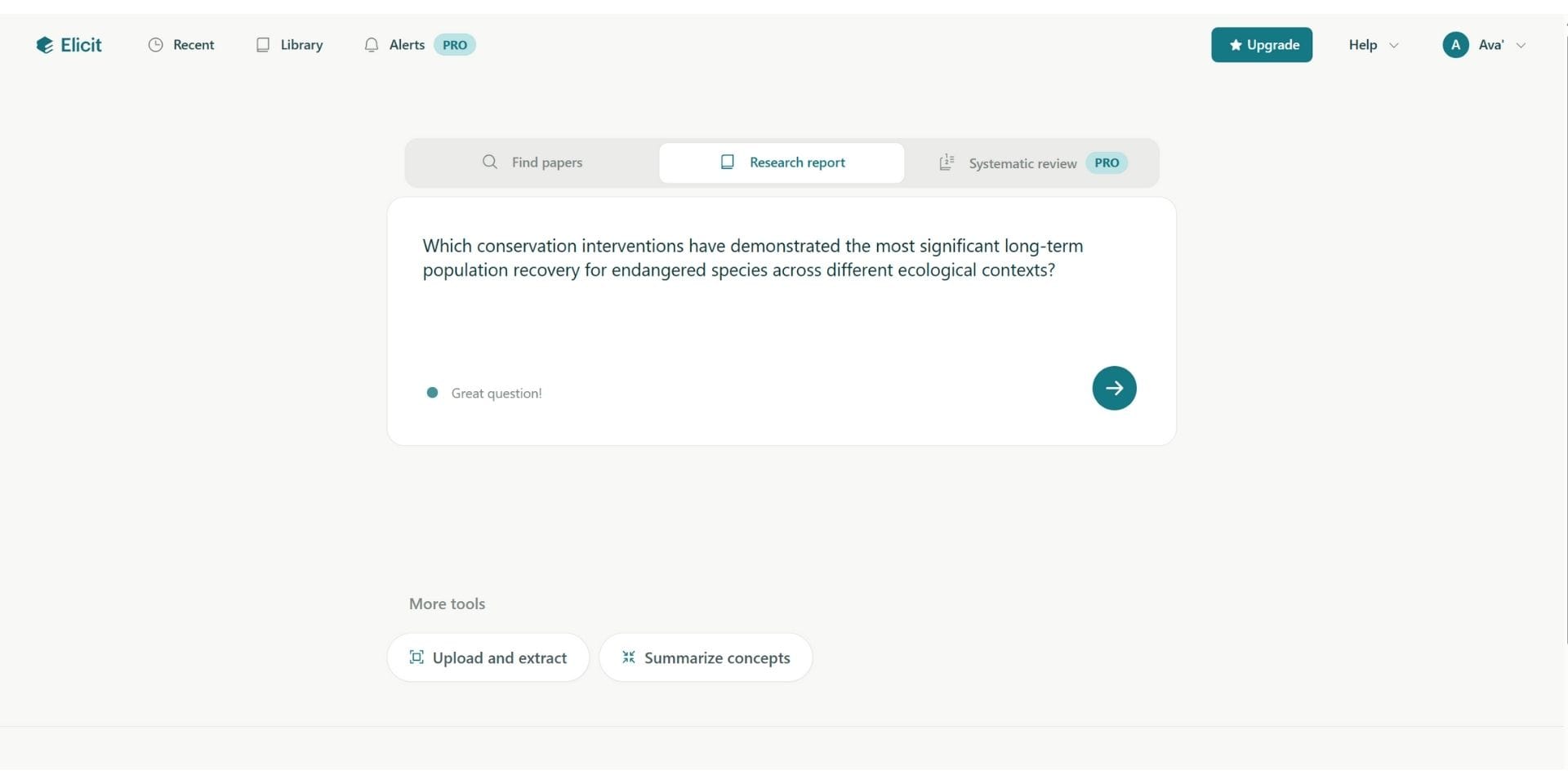
Elicit is an AI-powered tool designed to streamline the process of systematic reviews and research synthesis. By automating time-consuming tasks like summarizing research papers, extracting data, and generating insights, Elicit helps researchers speed up the review process while ensuring high accuracy. With access to over 125 million academic papers, Elicit enables researchers to quickly analyze large volumes of research, making it an essential tool for conducting efficient and thorough systematic reviews and meta-analysis. However, the dedicated systematic review functionality is only available for pro plan users.
Key Features of Elicit
| Feature | Description |
|---|---|
| Automated Data Extraction | Elicit automatically extracts relevant data points from research papers, saving time spent on manual data extraction. |
| AI-Powered Summaries | The tool generates concise, AI-driven summaries of research papers, making it easier for researchers to quickly understand key findings. |
| Customizable Research Templates | Users can create and customize research templates for their systematic review, tailoring it to specific research needs. |
| Advanced Search Filters | Elicit offers advanced search filters, enabling researchers to narrow down results by specific study designs, sample sizes, and other relevant parameters. |
| Collaboration Tools | Enables real-time collaboration, allowing multiple users to work on the same research project, improving efficiency in team-based reviews. |
Pros
- Time-Saving: Automates repetitive tasks such as data extraction and paper summarization, reducing manual effort.
- AI-Powered Insights: Provides AI-driven summaries and data extraction, helping researchers quickly identify key findings from large sets of papers.
- Customizable: Offers customizable templates and advanced search filters, making it adaptable for various research projects.
- Real-Time Collaboration: Enables team members to collaborate on reviews simultaneously, improving productivity in group projects.
Cons
- Learning Curve: Some advanced features may require time to understand, especially for those unfamiliar with AI-powered tools.
- Pricing: The Pro and Team plans can be expensive for smaller research teams or independent researchers.
- Limited Features in Free Plan: The free plan offers basic features, which may not be sufficient for large-scale or complex systematic reviews.
Best For
- Academic researchers, PhD scholars, and students who need an AI tool for systematic review and data synthesis.
- Research teams conducting systematic reviews and meta-analysis who require collaboration tools and AI-driven automation for large-scale projects.
- Those seeking a comprehensive AI tool for research synthesis and summarization to speed up the systematic review process.
Pricing
- Free Plan: $0/month
- Includes automated research reports, unlimited search across over 125 million papers, unlimited summaries of 4 papers, and data extraction from 20 papers per month.
- Plus Plan: $12/month
- Includes everything in Free, plus unlimited summaries of 8 papers, unlimited chat with 8 full-text papers, export to RIS, CSV, BIB, and data extraction from 50 papers per month.
- Pro Plan: $49/month
- Includes everything in Plus, plus data extraction from 200 papers per month, dedicated workflows for systematic reviews, and the ability to add up to 20 columns to tables.
- Team Plan: $79/user/month
- Includes everything in Pro, plus data extraction from up to 300 papers per month per user, live-editing for Notebooks and Systematic Reviews, and admin panel with usage tracking.
4. Rayyan
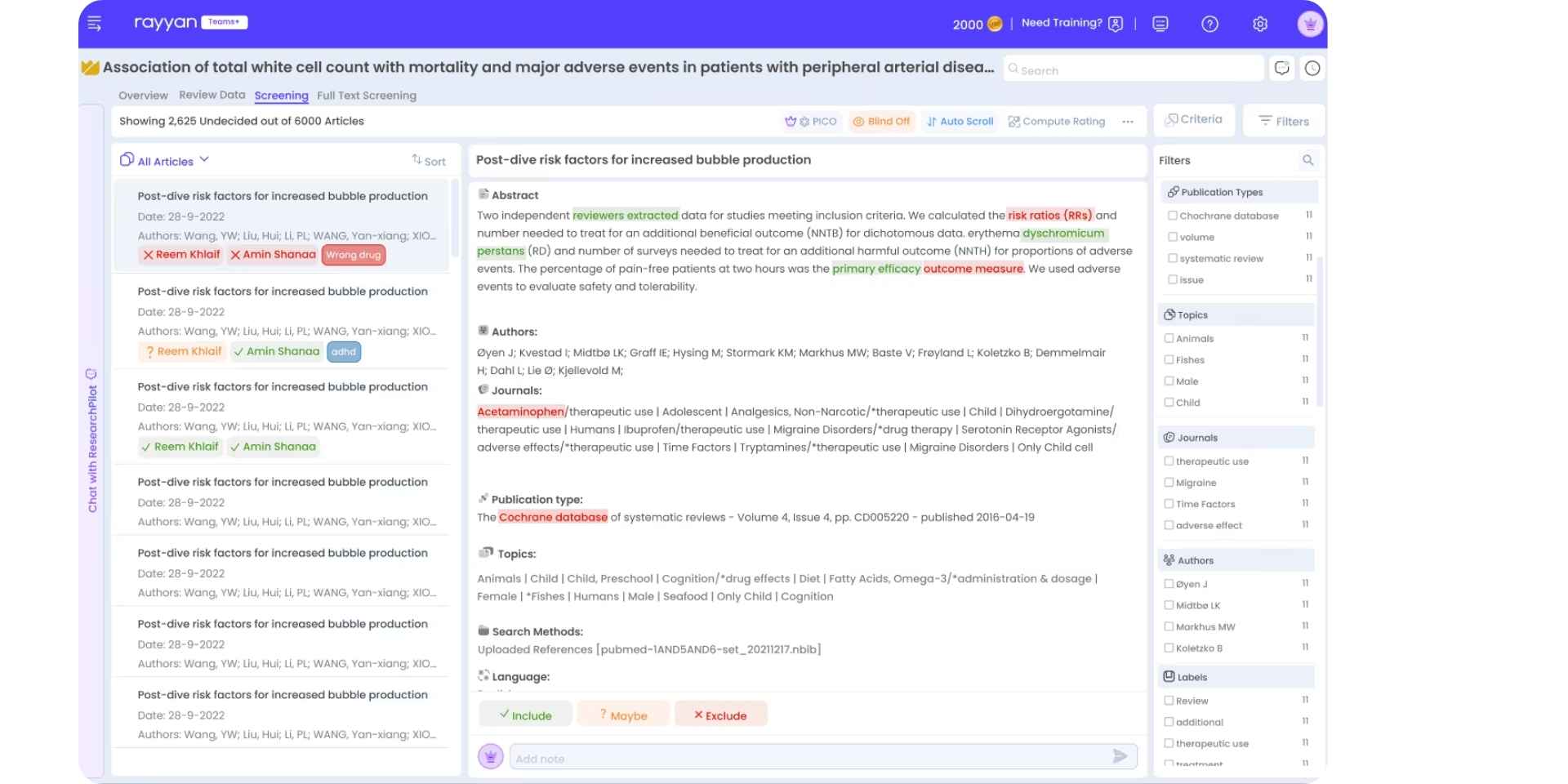
Rayyan is an AI-powered tool designed to assist with the systematic review process, particularly during the study screening phase. Researchers use Rayyan to quickly and efficiently screen titles and abstracts, significantly reducing the time required for manual study selection. The tool employs machine learning to suggest relevant studies based on user input and helps researchers identify duplicates across databases. It also supports collaboration, allowing multiple users to review studies in parallel, enhancing team productivity during systematic reviews.
Key Features of Rayyan
| Feature | Description |
|---|---|
| AI-Powered Study Screening | Rayyan uses machine learning to suggest which studies are relevant based on the user’s input, speeding up the screening process. |
| Duplicate Detection | The tool automatically identifies and flags duplicate studies across multiple databases, ensuring no important research is overlooked. |
| Collaborative Review | Rayyan allows multiple reviewers to work simultaneously on the same study set, making it easier for research teams to collaborate on systematic reviews. |
| Customizable Screening Criteria | Users can set custom screening criteria to refine the studies included in the review, helping to focus on the most relevant research. |
| Tagging and Labels | Researchers can use tags and labels to organize and categorize studies efficiently during the review process. |
Pros
- Free Access: Rayyan offers a free plan, making it accessible for independent researchers or smaller teams.
- Efficiency: AI-powered relevance ratings and duplicate detection help researchers streamline the study selection process, saving time.
- Collaboration Features: Facilitates team collaboration, allowing multiple researchers to work together in real-time on the same review.
- User-Friendly Interface: Simple and intuitive interface that is easy to navigate, even for users unfamiliar with AI tools.
Cons
- Limited Advanced Features in Free Plan: Some features, such as advanced reporting, are only available in paid plans.
- Basic Reporting: The tool’s reporting features are somewhat limited compared to more advanced systematic review tools.
- Best for Screening: While excellent for study screening, it lacks more in-depth features for data extraction and research synthesis compared to other tools.
Best For
- Researchers and research teams who need a fast, efficient tool for the study screening phase of a systematic review.
- Independent researchers or small teams looking for a free tool with collaborative features for managing systematic reviews.
- Research teams who need a tool to identify duplicates and categorize studies effectively during the screening process.
Pricing
- Free Plan: $0/month
- Includes 3 active reviews, unlimited reviewers, and basic features such as study screening, duplicate detection, and tagging.
- Professional Plan: $8.33/month (Billed Annually)
- Includes unlimited active reviews, advanced features, and priority support for larger-scale reviews.
5. DistillerSR
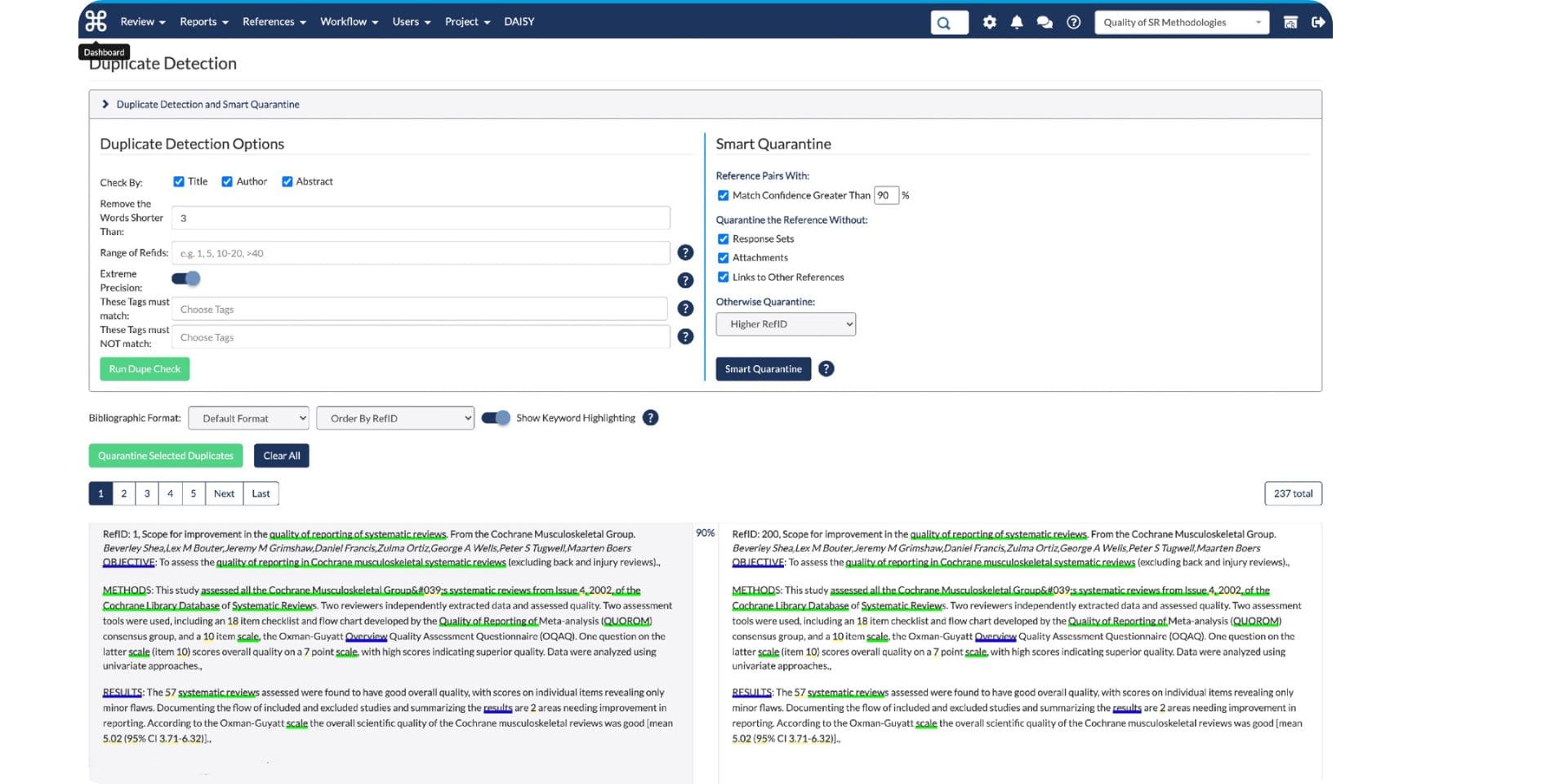
DistillerSR is a comprehensive systematic review software designed to automate and streamline the review process. It offers an AI-driven approach to study selection, data extraction, and quality assessment for systematic reviews. DistillerSR helps researchers save time and improve accuracy by automating tasks that would otherwise be done manually, such as screening studies, extracting key data points, and generating reports. This tool is widely used in academic institutions, research organizations, and by professionals who need to manage large-scale, complex systematic reviews.
Key Features of DistillerSR
| Feature | Description |
|---|---|
| Automated Study Selection | DistillerSR automates the study selection process, reducing the time spent on manual review and improving efficiency. |
| AI-Powered Data Extraction | The tool automates data extraction by identifying and collecting key data points from research papers, ensuring accuracy and speed in the review process. |
| Quality Assessment | Includes tools for risk of bias and quality assessment, helping ensure that the studies included in the review are reliable and valid. |
| Collaboration Features | Supports real-time collaboration between multiple researchers, making it easier for teams to work together on large-scale reviews. |
| Customizable Workflow | DistillerSR allows users to tailor workflows to fit their specific review needs, providing flexibility for different types of reviews and research questions. |
Pros
- Comprehensive Automation: Automates key tasks in the systematic review process, reducing the amount of manual effort required.
- Customizable Workflows: Offers flexibility to customize workflows based on specific review needs, making it adaptable for different research projects.
- Real-Time Collaboration: Enables team collaboration, allowing researchers to work together on the same review simultaneously.
- Advanced Reporting: Provides advanced reporting features, helping researchers generate detailed, customizable reports of their findings.
Cons
- Cost: DistillerSR can be expensive, especially for smaller research teams or independent researchers.
- Complexity: The tool may be challenging for new users to learn due to its advanced features and customizable workflows.
- Limited Free Version: The free version offers limited functionality, making it unsuitable for larger or more complex reviews.
Best For
- Research teams and academic institutions that need a comprehensive tool to handle large-scale systematic reviews and meta-analysis.
- Researchers who need to automate the study selection, data extraction, and quality assessment process for complex reviews.
- Organizations looking for an enterprise-grade solution to manage systematic reviews with real-time collaboration and customizable workflows.
Pricing
- Student Plan: $19.95/month
- Includes basic features like study screening, data extraction, and quality assessment for smaller-scale reviews.
- Faculty Plan: $85/month
- Includes everything in Student Plan, plus advanced features like custom workflows and collaboration tools for larger research teams.
- Research Project Plan: $176/month
- Includes everything in Faculty Plan, plus advanced reporting and real-time collaboration for multi-user access.
Final Comparison of Best AI Tools for Systematic Research in 2026
| Tool | Key Features | Pricing | Best For |
|---|---|---|---|
| Paperguide | Deep Research Reports, AI Search, AI Paper Writer, AI Literature Review, Reference Manager | Free Plan, Plus Plan ($12/month), Pro Plan ($24/month) | Academic researchers, PhD scholars, research teams |
| Scispace | Deep Review Model, AI-driven synthesis, real-time collaboration | Free Plan, Pro Plan (starts at $10/month) | Research teams, PhD scholars, academic institutions |
| Elicit | AI-powered summaries, automated data extraction, advanced search filters | Free Plan, Plus Plan ($12/month), Pro Plan ($49/month) | Researchers seeking fast summaries and AI-driven insights |
| Rayyan | AI-powered relevance ratings, duplicate detection, real-time collaboration | Free Plan, Professional Plan ($8.33/month) | Researchers working on study screening phases |
| DistillerSR | Automated study selection, AI-powered data extraction, risk of bias assessment | Student Plan ($19.95/month), Faculty Plan ($85/month) | Research teams, institutions conducting large-scale reviews |
Which AI Tool for Systematic Review is Best for You?
- Paperguide is ideal for those looking for an all-in-one AI research assistant that can automate systematic reviews, data extraction, and report generation while enabling real-time collaboration. It's perfect for academic researchers who want to save time and streamline their research process.
- Scispace stands out for its Deep Review Model, which offers advanced synthesis of research findings and real-time collaboration. It's best suited for research teams that need to work together efficiently on large-scale projects.
- Elicit is perfect for researchers who need quick AI-powered summaries and data extraction for systematic reviews and meta-analysis. Its customizable templates make it a great choice for those looking for a flexible and fast solution.
- Rayyan is the go-to tool for study screening, offering AI-powered relevance ratings and duplicate detection. It's great for individual researchers or small teams working on early-stage systematic reviews.
- DistillerSR is ideal for large research teams and academic institutions working on complex systematic reviews that require extensive data extraction and risk of bias assessments. It offers robust collaboration and reporting features.
Conclusion
As AI tools significantly improve the efficiency and accuracy of systematic reviews, automating time-consuming tasks such as data extraction, study screening, and synthesis of findings, these tools help researchers process large volumes of research data quickly, ensuring thoroughness while reducing the potential for human error.
Among the tools discussed, Paperguide stands out for its ability to fully automate the systematic review process, from research question formulation to report generation. Scispace is valuable for teams requiring real-time collaboration and in-depth research synthesis with its Deep Review Model. Elicit excels in summarizing research and data extraction, making it ideal for researchers needing quick, accurate insights. Rayyan is perfect for study screening, helping users efficiently identify relevant studies, while DistillerSR is a top choice for large teams conducting complex reviews that require risk of bias assessments and customizable workflows.
Frequently Asked Questions
What is a systematic review in research?
A systematic review is a structured and comprehensive process for identifying, evaluating, and synthesizing all relevant research on a specific topic. It follows a predefined methodology to minimize bias and ensure transparency, reproducibility, and reliability in scientific research.
How do systematic reviews improve research quality?
Systematic reviews improve research quality by ensuring that all relevant studies are considered using consistent criteria. This reduces selection bias, strengthens evidence synthesis, and helps researchers draw reliable, evidence based conclusions for scientific and policy decision making.
What is the best AI tool for systematic literature review in 2026?
Paperguide is the best AI tool for systematic literature review in 2026, especially for scientific research. It automates the entire review workflow from literature discovery and screening to data extraction, synthesis, and citation backed reporting, making it ideal for researchers, PhD scholars, and academic teams.
How do AI tools help with systematic reviews?
AI tools assist with systematic reviews by automating repetitive and time consuming tasks such as study screening, data extraction, and literature synthesis. This allows researchers to handle larger datasets efficiently while maintaining methodological consistency.
How do AI tools improve the speed and accuracy of systematic reviews?
By reducing manual effort, AI tools significantly speed up the review process and minimize human error. Automated extraction, structured synthesis, and citation backed summaries improve both the accuracy and consistency of systematic review outcomes.
Which is the best AI tool for systematic review and scientific research?
For researchers seeking full automation and high quality outputs, Paperguide is the best AI tool for systematic review and scientific research in 2026. Its Deep Research feature enables end to end automation while maintaining transparency, accuracy, and reproducibility across large scale reviews.





